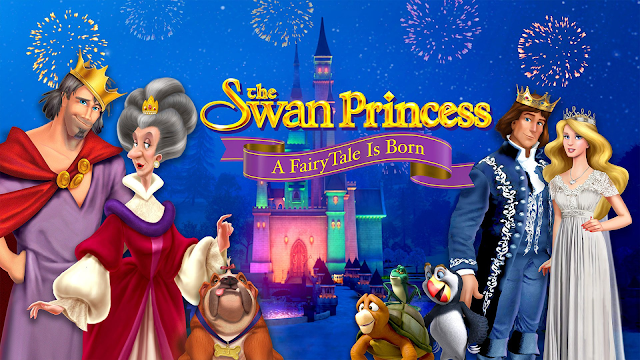Review: The Princess Game
I completed The Princess Game: A Reimagining of Sleeping Beauty in record time, solidifying my current obsession with Melanie Cellier's fairy tale princess books. This is the last book in her Four Kingdoms series, but not the last to take place in Melanie's extended princess universe. The Beyond the Four Kingdoms series is still in progress, which means there will be plenty of new literature to look forward to in this realm of fairy godmothers and suspense. However, this book still marks the end of one era and the beginning of another. So, how does The Princess Game hold up in comparison to The Princess Companion, The Princess Fugitive, and The Princess Pact?
There were a few notable differences that stood out to me right away. It's the first book in the series to be written in first person format, which probably should have been done earlier because the other books were clearly meant to be from the perspective of the princesses, even going so far as to occasionally switch to that of the prince while remaining in third person. It was also the first to be base on a fairy tale that had already been turned into a well-known movie. Considering that Melanie's previous books took somewhat less popular fairy tales and gave them an original spin so she could make them entirely her own, I was surprised to find that this one had several references that were specific only to the Disney movie and not the fairy tale itself, such as the name "Aurora," the dragon imagery, and the three good fairies (as opposed to twelve from the original story). There were even a few small nods to Maleficent, Disney's live-action adaptation from 2014. That is not to say that it was by any means the same as the story portrayed in the 1959 animated feature, though. In fact, the plot was vastly different from any other "Sleeping Beauty" adaptation I've ever seen.
The book reads a little like a James Bond movie if James Bond also happened to be a princess. Instead of foolishly pricking her finger and becoming inactive for the rest of the story, The Princess Game flips the script of the "Sleeping Beauty" story and makes the heroine doubly active due to her curse. Princess Celeste leads two lives. The effect of her curse requires her shrewd mind to appear to be asleep in the public eye. In private, she is the kingdom's spymaster, uncovering plots against the crown through her many agents within the castle who are unaware of her true identity. While it is a bit of a stretch that the curse could be altered so much from death to sleep to a mere inconvenience, it still makes for an exciting story. Another thing that didn't make sense was how Celeste's aunt, who appeared to have no supernatural abilities, would have been able to place a curse on her as a baby causing her to die when she turned sixteen in the first place. This book had many more inconsistencies than the others, but it definitely gets points for originality.
Of all the fairy tale adaptations I've read, The Princess Game has the most in common with Gail Carson Levine's Newbery Award-winning Ella Enchanted. Both books take well-known fairy tales and turn them on their head, making it so that the heroines who appear passive outwardly are actually fighting a very active internal battle against the unfortunate circumstances of their childhood. Just as Ella tried to test the limits of her obedience curse in Ella Enchanted resulting in great physical discomfort when she went too far, Celeste outsmarts her curse by becoming an alter ego to the "spymaster," which she does by covering her face with a scarf and using the code name "Aurora." The curse doesn't affect her if people don't realize her identity. Her duel nature of being beautiful but air-headed in public and intelligent but stoic in private makes us question the very nature of the vain princess archetype. Does carrying a coveted outward appearance mean that you cannot also be brilliant internally? It's the same question posed by the 2001 movie-turned-Broadway-musical Legally Blonde. The answer, of course, is no.
The Princess Game comes off more as an allegory than the other books in The Four Kingdoms series. It still had the same suspense, romance, and quick-witted heroines as all of the other princess heroines, but it also had more of an introspective view on human nature and those who personally identify with storybook princesses. Anyone can put on a pretty dress and attract attention, but that does not mean that you can't also be a brave and cunning leader who is capable of changing the world. Overall, I think my favorite book in the series was The Princess Pact because I related more to Marie than to Celeste, but The Princess Game was a fitting and thought-provoking conclusion.
There were a few notable differences that stood out to me right away. It's the first book in the series to be written in first person format, which probably should have been done earlier because the other books were clearly meant to be from the perspective of the princesses, even going so far as to occasionally switch to that of the prince while remaining in third person. It was also the first to be base on a fairy tale that had already been turned into a well-known movie. Considering that Melanie's previous books took somewhat less popular fairy tales and gave them an original spin so she could make them entirely her own, I was surprised to find that this one had several references that were specific only to the Disney movie and not the fairy tale itself, such as the name "Aurora," the dragon imagery, and the three good fairies (as opposed to twelve from the original story). There were even a few small nods to Maleficent, Disney's live-action adaptation from 2014. That is not to say that it was by any means the same as the story portrayed in the 1959 animated feature, though. In fact, the plot was vastly different from any other "Sleeping Beauty" adaptation I've ever seen.
The book reads a little like a James Bond movie if James Bond also happened to be a princess. Instead of foolishly pricking her finger and becoming inactive for the rest of the story, The Princess Game flips the script of the "Sleeping Beauty" story and makes the heroine doubly active due to her curse. Princess Celeste leads two lives. The effect of her curse requires her shrewd mind to appear to be asleep in the public eye. In private, she is the kingdom's spymaster, uncovering plots against the crown through her many agents within the castle who are unaware of her true identity. While it is a bit of a stretch that the curse could be altered so much from death to sleep to a mere inconvenience, it still makes for an exciting story. Another thing that didn't make sense was how Celeste's aunt, who appeared to have no supernatural abilities, would have been able to place a curse on her as a baby causing her to die when she turned sixteen in the first place. This book had many more inconsistencies than the others, but it definitely gets points for originality.
Of all the fairy tale adaptations I've read, The Princess Game has the most in common with Gail Carson Levine's Newbery Award-winning Ella Enchanted. Both books take well-known fairy tales and turn them on their head, making it so that the heroines who appear passive outwardly are actually fighting a very active internal battle against the unfortunate circumstances of their childhood. Just as Ella tried to test the limits of her obedience curse in Ella Enchanted resulting in great physical discomfort when she went too far, Celeste outsmarts her curse by becoming an alter ego to the "spymaster," which she does by covering her face with a scarf and using the code name "Aurora." The curse doesn't affect her if people don't realize her identity. Her duel nature of being beautiful but air-headed in public and intelligent but stoic in private makes us question the very nature of the vain princess archetype. Does carrying a coveted outward appearance mean that you cannot also be brilliant internally? It's the same question posed by the 2001 movie-turned-Broadway-musical Legally Blonde. The answer, of course, is no.
The Princess Game comes off more as an allegory than the other books in The Four Kingdoms series. It still had the same suspense, romance, and quick-witted heroines as all of the other princess heroines, but it also had more of an introspective view on human nature and those who personally identify with storybook princesses. Anyone can put on a pretty dress and attract attention, but that does not mean that you can't also be a brave and cunning leader who is capable of changing the world. Overall, I think my favorite book in the series was The Princess Pact because I related more to Marie than to Celeste, but The Princess Game was a fitting and thought-provoking conclusion.












Comments
I really enjoyed reading your insightful comments about this one, and the compare/contrast with other books and movies is fascinating.